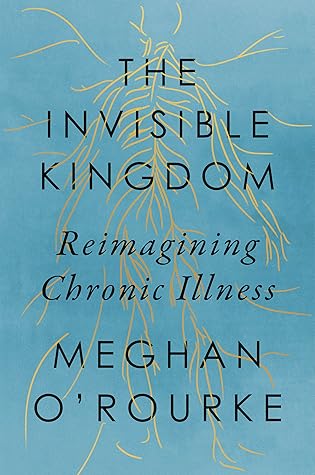More on this book
Community
Kindle Notes & Highlights
Read between
March 10 - March 29, 2023
My experience of being ill led me to see that our bodies may feel autonomous, but we all live in the nexus of radical interconnection. Our bodies are always in communication with other bodies: our immune system is responsive not only to collective health policies but also to the emotions and affects of others.
I remember being so lost in the sun and the dog’s joy and my pleasure in these hours of freedom that I had no sense that I lived in a body, except as a thing that could feel the sun and the wind and the dog’s cold nose.
Instead, I’d become someone without an inner life.
“To him who waits, all things come! . . . Ever since I have been ill, I have longed and longed for some palpable disease, no matter how conventionally dreadful a label it might have.” Anyone who has suffered from an unnamed illness can understand the perversity of the logic.
sodium glow
Weren’t people there to heal?
I had no ally—worse, the encounter left me with a rusty taste in my mouth, a sense that perhaps I didn’t deserve an ally. For this is the strange thing about a vulnerability that remains unseen by others, an illness that is unacknowledged by society. It is the sick person whose worldview warps, the wounded one who absorbs the idea that the most indelible aspect of her present condition is in fact a defect, a distortion of her own making.
The most alarming fact I learned, when I began my research, was how quickly doctors’ empathy wanes. Multiple studies show that it plunges in the third year of medical school, declining when students start seeing patients on rotation and, overworked and overtired, they realize that there is too much work to be done in too little time, or end up distancing themselves self-protectively from their patients in order to survive.
“We call it the doctor-patient relationship, but in many ways it’s the doctor-down-to-the-patient relationship,” he told me. “Patients need to be relentlessly assertive and ask their questions as many times as necessary, until they get answers they can understand. It is their body; it is their well-being; they deserve an answer. It is up to the doctors then to say, ‘I know it’s this,’ or ‘I don’t know, but I’ll try to learn more,’ or ‘I am stumped and think we should get additional input.’ ”
“I think it has to do with physicians’ difficulties in tolerating uncertainty,” she told me. “The nagging worry is that if you can’t see it objectively, you are missing something medically or being bamboozled somehow—fooled by the patient.
“The secret of the care of the patient is in caring for the patient.”
One young woman I interviewed told me, “I wish doctors had just looked me in the eye and said, ‘I don’t know what’s wrong with you. But I believe you. And one day we’ll figure it out.’ I would have had so much more confidence in that person. To have the arrogance to believe we know everything about everything! The number of physicians who said, ‘There’s nothing wrong with you. You’re just depressed’—well, it was so demeaning.”
after all, the idea that thoughts could influence body and body could influence thought hardly seems surprising. The problem is that so many patients’ ailments have been reduced to one or the other as a way of shutting down inquiry.


